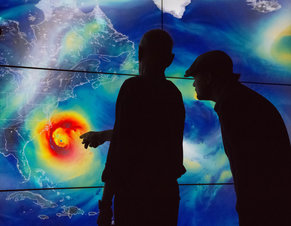
Speed of Light
Information can't be transmitted faster than the speed of light. This can make things unknowable. For example, distant parts of the universe are expanding away from us faster than the speed of light. A message sent from these places would never arrive as the distance the message needs to travel increases faster than the message can move. This may feel counterintuitive due to the common belief that nothing can move faster than the speed of light. However, it is considered hard science that the universe is expanding faster than the speed of light from the perspective of places that are far apart. The speed of expansion between any two points can be calculated with the Hubble constant.Lost Information
Information is quickly created and destroyed and relatively little information persists over time. For example, an individual holds a thought for a few moments and may forget it and move on. This has implications for fields such as history and science whereby the past can never be fully known because information has been destroyed. For example, historians may guess why a historical figure took an action but they can't know with any certainty unless the reason was fully recorded by the individual without bias. Likewise, certain things can't be known about long extinct species because the information no longer exists.Unfalsifiable Theories
A falsifiable theory is a theory that can be disproved with a hypothetical observation. If you say that all bananas are yellow, the discovery of a green banana would disprove this theory. According to the scientific method, the truth of a theory can't be accepted if it isn't falsifiable. This is because there is no way to disprove the theory even if it were wrong. For example, the claim "there are green river monsters in Japanese rivers known as kappa", can't be disproven with a single observation. Unfalsifiable theories can be considered unknowable because they can't be disproven. Most myths that survive history are unfalsifiable because otherwise someone would disprove the myth and it would fade. Beyond the scientific method, people may feel that they know that an unfalsifiable theory is correct and they may be right. There just isn't any way to independently challenge the theory.Sensory Limitations
There are things that human's can't directly sense. For example, we can't directly see light outside of the band of wavelengths in the visible spectrum. It is possible that our senses are completely unaware of something such that we haven't developed electronic sensors to detect such information. It is also possible that it is beyond our technological capabilities to build such sensors.Cognitive Limitations
Information may be off-limits to us due to limitations of our mind. For example, from a philosophical point of view, we can't confirm that any information we sense is real. This can be demonstrated with a simple thought experiment such as the possibility that the universe as we observe it is a simulation such that anything outside of this simulation is unknowable to us.Paradox
A paradox is a seemingly absurd or self-contradictory statement that defies logic and rational thought. For example, "this sentence is not known" or "all I know is that I know nothing."Future
Beyond simple events in a controlled environment, the future can't be predicted with certainty. This can be demonstrated with a thought experiment. For example, if it were possible to predict with certainty that a stock will fall in price tomorrow, people would rush to sell it and the price would fall today instead of tomorrow. In other words, predicting the future tends to change the future to make it unpredictable.Notes
The fact that things exist that are unknowable may make life more interesting as life defies complete comprehension. Mystery will persist despite the human talent for discovery and definition.| Overview: Unknowable | ||
Type | ||
Definition | A category of information that can't be known with certainty. | |
Related Concepts | ||




























